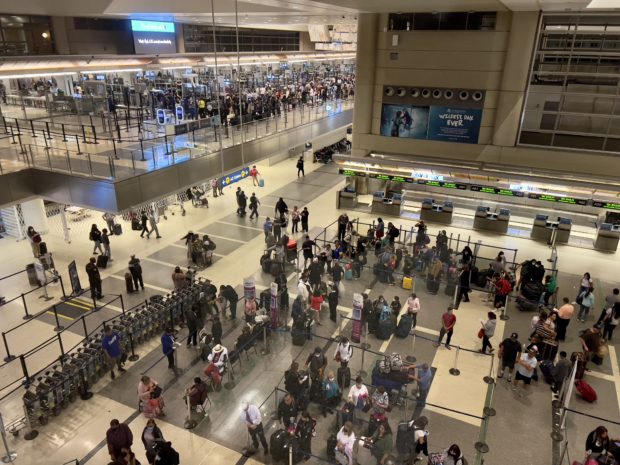Air tickets set to keep climbing from pandemic low—experts

Departure ticket counters at Los Angeles International Airport in Los Angeles, California on June 19, 2022. (Photo by Daniel SLIM / AFP)
DOHA — Propelled by inflation, the price of air tickets has begun to take off again after tumbling during the pandemic, a reversal that looks set to intensify due to environmental pressures, experts say.
For members of the International Air Transport Association, gathered in Doha for their annual meeting this week, minds are focused on how far such increases risk undermining passenger growth targets.
The IATA is also pleading for government support in reconciling the long-term commitment to net zero carbon emissions with those ambitious targets.
The aviation industry has just gone through two years where planes flew with rows of empty seats, even as they offered fares much lower than before the Covid-19 pandemic.
But with the sector still mired in the red despite movement restrictions being largely lifted, the bargain bonanza for passengers is very much over.
Article continues after this advertisementIn the United States, the average price of an internal flight has shot up, from $202 in October 2021 to $336 in May this year, according to the Federal Reserve Bank of Saint Louis.
Article continues after this advertisementIn the European Union, the price of a return ticket before tax in April returned to that seen in the same month of 2019, after a near-20 percent fall in 2020, according to aviation research specialists Cirium.
The oil price shock stoked by Russia’s invasion of Ukraine is the most obvious factor in these price rises.
Airlines estimate that fuel prices will account for 24 percent of their total costs this year, up five percentage points from last year.
Ticket prices are also being stoked by wider inflation — now at 40-year-highs in developed markets — as well as stronger-than-expected demand for tickets and labour shortages.
Reality check
But Scott Kirby, chief executive of United Airlines, said despite the trend clearly rising, prices had yet to shoot beyond historical norms.
“In real terms, pricing is back to 2014 levels… and it’s lower than it was essentially every year before” then, he said.
“So… I don’t think we’re going to see demand destruction.”
But Vik Krishnan, a partner at McKinsey & Co, is cautious about how long the current high demand will last.
“Some of the travel that we’re seeing right now is a function of all the stimulus that governments” pumped into economies during the pandemic, boosting citizens’ spare income, he said.
“The number one discretionary income spending is travel and that’s what people are doing.
But “how long that lasts remains to be seen”, he added.
Climate crisis versus cheap holidays
Beyond rising costs and fears that government stimulus will fade, airlines face commitments that sit very uneasily alongside each other.
On the one hand, they target carrying a total of 10 billion passengers by 2050, up from 4.5 billion in 2019.
And yet over the same time horizon, they are beholden to achieving “net zero” carbon emissions.
The total cost of transitioning the sector to “net zero” is estimated by the IATA at an eye-watering $1.55 trillion.
“Airlines don’t have the ability to absorb” the cost of that transition, IATA director general Willie Walsh said this week.
To reduce carbon emissions, the industry focus is on sustainable aviation fuels (SAFs), which are currently two to four times more expensive than fossil-based aviation fuel.
Some governments have already imposed SAF quotas, albeit in small quantities, resulting in airlines in turn imposing surcharges.
On Tuesday, the IATA urged governments to provide subsidies to ensure SAF production reaches 30 billion litres in 2030, up from 125 million litres in 2021. It also wants price curbs.
But even if such subsidies are forthcoming, “the transition to net zero will have to be reflected in ticket prices,” Walsh said.
Could that reverse the long-standing global trend of air travel progressively extending beyond the wealthy?
Krishnan believes such “democratisation” will become “harder”.
But he also said “low cost airlines have unleashed a world where people living in Northern Europe took it for granted that they could go on cheap vacations in Southern Europe”.
It would be “very hard for governments to unwind” such entrenched expectations, he warned.
RELATED STORIES
Air industry could fly back into black next year, IATA says
Airline industry sees long-term rebound for sector
Emirates warns Omicron could cause ‘significant traumas’ for aviation industry